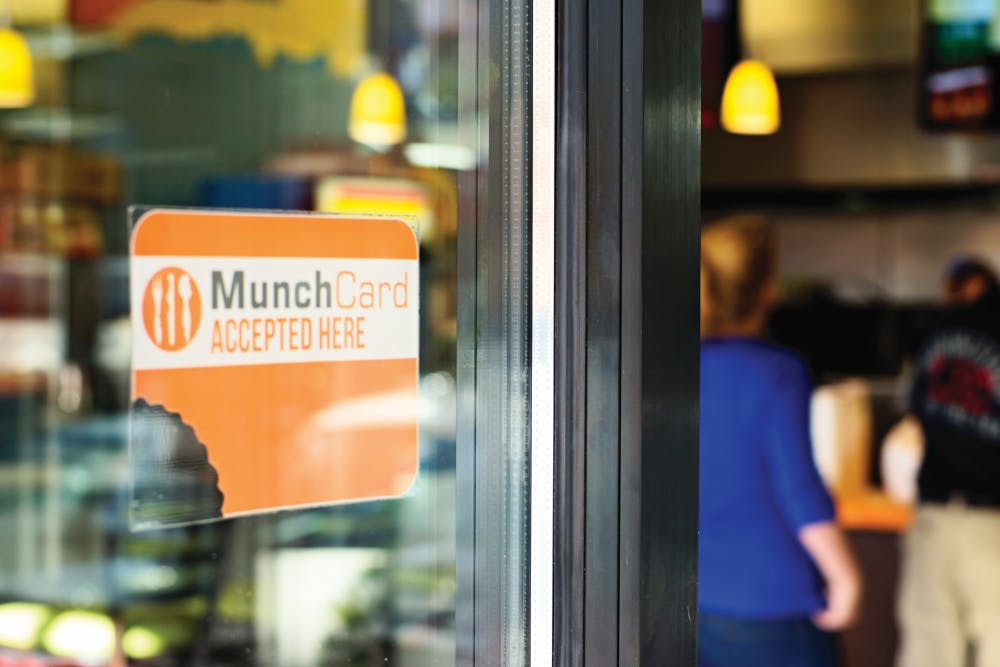MunchCard, a discount payment method for College Hill restaurants that swept across campus last year, has been acquired by another company, and the service will be suspended for at least the duration of this semester.
Though the exact timeline is unclear, a Sept. 4 email to MunchCard users informed them of the service's temporary suspension while it is being acquired. The card team is in the process of refunding existing card balances to its users, according to the email.
MunchCard founder Benjamin Vishny '14 said he was not authorized to speak directly to reporters about the details of the acquisition since it has not yet been completed. But since the organization guarantees its customers full disclosure, The Herald was able to obtain details about it from a cardholder.
MunchCard was bought by a mobile payments company from Chicago, wrote Raquel Bryant '15, a MunchCard customer, in an email to The Herald. The card will not be back online this semester, because it will take at least four months to complete changes that are currently underway.
After a friend recommended the service, Bryant looked into MunchCard last spring, she said. Having chosen a lower meal plan this semester, she planned to use the card to supplement University dining options.
Justina Lee '15, who signed up for the service last semester, said she was "somewhat counting on it" because she went off meal plan this semester.
"I'm a poor college student," she said, citing the discounts MunchCard holders received at restaurants such as Meeting Street Cafe as a motivator to use the card. She said she used her card "at least once a week, if not more."
Ideally, MunchCard would not have suspended its service during the acquisition, Vishny told The Herald. Some vendors who partner with the service expressed concerns about the transfer and a desire to "get to know" the new owners before dedicating themselves to a new program, he said.
Meeting Street Cafe owner David McAllister said he was "incredibly disappointed" to learn of MunchCard's suspension. He was "sold on the program" after just a few meetings with Vishny, he said.
Some cardholders expressed qualms regarding the status of their personal information, but the organization cleared its database of "personally identifiable information" before passing it to the acquiring company, Vishny wrote in an email to The Herald.
The acquiring company, whose name remains undisclosed, had approached the MunchCard team multiple times since April. The MunchCard team unanimously decided it was in their business' best interest to accept the acquiring company's offer. Though Vishny and his team will remain a part of the organization to focus on "creative vision," he said they will no longer make final decisions for the company.
From the outset, it was always clear to the MunchCard team that they would eventually need to look to outside resources to keep the program alive, Vishny wrote.
He said he hopes the transfer will incorporate new technology to allow MunchCard to grow to other locations and campuses and make purchases more efficient. "We've always wanted to make MunchCard the best," Vishny said.
The acquisition has been rife with rumors. Vishny said he has been approached asking if he had received $10 million for the company. "Definitely much less," he said he responded.
Vishny said MunchCard considered handing over operations to the University, but added that the "University is very wary of maintaining student projects after graduation."
"We were aware that Dining Services felt somewhat threatened by MunchCard," he wrote, adding that his team never saw itself as a competitor with Dining Services. He added that the University had "tacitly supported" the venture.
When the cards come back online, new features will include "peer-to-peer transfers," an integrated system that will allow card swipes in existing restaurant machines, as well as new mobile apps.





